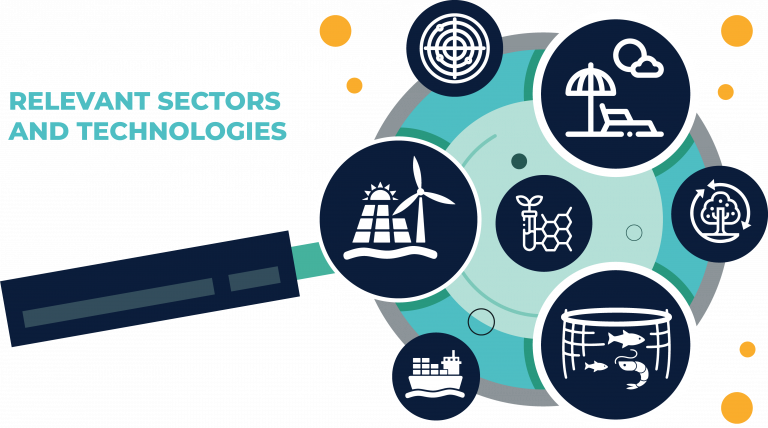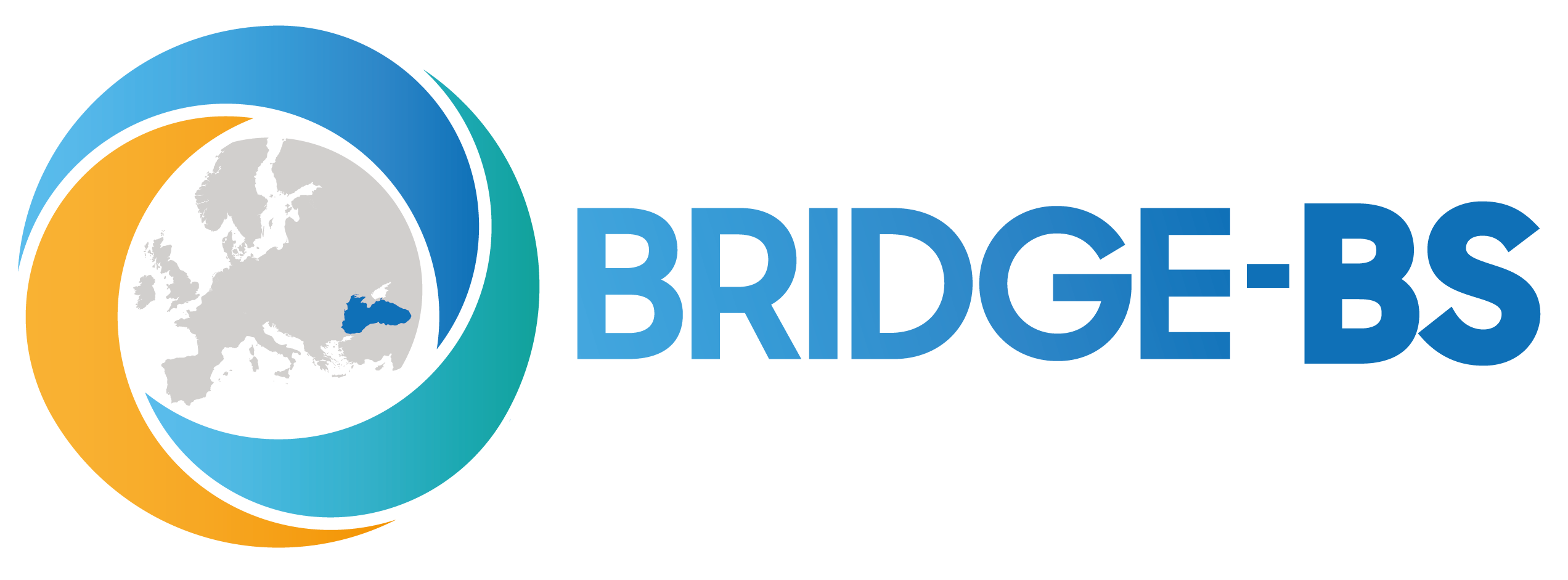BLACK SEA ACCELERATOR
Facilitated by BRIDGE-BS and DOORS Projects
FOR A SUSTAINABLE BLUE ECONOMY
ABOUT THE BLACK SEA ACCELERATOR
Jointly promoted and managed by the BRIDGE-BS and DOORS projects, the Black Sea Accelerator (BSA) is a comprehensive initiative designed to foster the development of innovative blue economy projects aimed at sustainable growth in the Black Sea region. The BSA offers a range of targeted activities, including training sessions, workshops, and expert discussions, all geared toward supporting blue economy innovators. Selected participants receive free assistance to scale up their business ideas and gain access to valuable funding and investment opportunities. The main target is Black Sea-based eligible organizations such as companies, start-ups, organizations, and universities, but the program also welcomes non-regional applicants interested in extending their solutions in the region.
More than 40 applications were submitted in response to two calls, with select applications receiving BSA support.
BOATMATE
BOATSANDGO
HyrdocollacoidBS
GALERA 07 LTD
TRESOIL Power2X
R.E.N.E.W Nets
13 MARI
TramshipOS
BIOCRAC / BS-PYRO
RECYCLLUX
AQUAFEEDPRO
MINDS
MARITIME COUNCILOR
GREEN TECH PORTABLE POWERSTATION
WHAT SUPPORT DOES BSA OFFER?
Expert Support
The BSA provides comprehensive support to applicants through expert consultants who specialize in various areas. These consultants offer assistance in market analysis, identifying areas for improvement, and providing tailored advice to individual applicants.
Financing and Investment Facilitation
To aid applicants in securing financing and investments, the accelerator conducts "investors pitching" training sessions in groups. These sessions equip applicants with the necessary skills to effectively present their ideas and attract potential investors.
Start-up Support
For applicants with promising ventures, the accelerator offers valuable business mentoring support. This includes one-on-one guidance from experienced mentors who can provide valuable insights and help refine their business strategies.
Market Access Assistance
The accelerator aims to expand the reach of applicants beyond the Black Sea region. For non-Black Sea applicants, the accelerator offers support to connect with local potential partners who are interested in their proposed technologies or services.
Idea Validation
The BSA provides the opportunity to validate your business idea by testing your idea's viability, market demand, competitive landscape, and potential profitability through actual feedback from potential users.
Skill Development
With the support in developing the essential skills, the BSA secure a convincing startup or funding pitch to effectively communicate the value proposition of your venture, increasing your chances of success.

By playing a catalytic role in support of the blue economy and the development of sustainable practices for marine and maritime applications, marine and coastal observation and monitoring contribute to keeping our oceans healthy and conserving biodiversity, monitoring climate change, and fostering a sustainable blue economy.[1] Observation and monitoring of marine and coastal ecosystem quality – through the assessment of the impact of man-made activities, the conditions for sustainable exploitation of local ecosystems, as well as the assessment of policy baselines and monitoring of sectoral impact through time – allow for the development of complex value chains. These include data collection, transformation of such data into information and services, and offering the potential for the establishment of innovative start-ups and new businesses across the Black Sea region.
Some examples of marketable solutions for coastal and maritime monitoring and observations, supported by the BRIDGE-BS Accelerator, include (but are not limited to): cost-effective real-time monitoring, automated underwater/aerial drones, and sensors, applications offering water-quality assessments to aquaculture farms, immersive reality offering remote touristic experiences, surveillance and monitoring services for Port Authorities, data services for decision-making actors in the market, etc.
Port activities and maritime transport, with the related logistics services and infrastructures, are historically one of the most performing blue economy activities for the Black Sea.[1] several challenges, both regional[2] and global[3], have increasingly threatened the sustainability of the sector and new innovative practices and solutions are vital for its transformation such as decarbonization of transport. Amongst those transformations, is the transition towards the concept of Green Ports,[4] aimed at fostering energy-efficient and sustainable sources for port activities, and new business strategies to face a global crisis.[5]
Some examples of marketable solutions for ports, transport, and logistics, supported by the BRIDGE-BS Accelerator include (but are not limited to): solutions and services aimed at fostering ports as ‘decarbonization hubs’, digital solutions to improve real-time port and logistics management, innovative (green) port infrastructures and business services towards short-sea shipping promotion in the region, introduction electrified ships and other vehicles to the Black Sea region, etc.
[1] BRIDGE-BS D7.1 « GUIDELINES FOR THE ACCELERATOR PLATFORM IMPLEMENTATION”
[2] https://www.europarl.europa.eu/RegData/etudes/ATAG/2022/739267/EPRS_ATA(2022)739267_EN.pdf
[3] https://unctad.org/webflyer/covid-19-and-maritime-transport-navigating-crisis-and-lessons-learned
[4] https://www.ecoports.com/about
[5] https://unctad.org/system/files/non-official-document/cimem9_2022_P2_SUBRAMANIAM_0.pdf
Fisheries is another relevant activity for the region which is increasingly regulated to avoid illegal and unsustainable practices.[1] Globally, marine aquaculture has emerged in the past decade as a viable solution for an effective option in the exploitation of marine resources for the production of food and added-value products/services.[2] The Black Sea has recently seen a similar pattern in the growth of aquaculture practices, although currently challenged by the regional crisis, but greater sustainable innovation is needed to make the sector fully profitable and respectful of local ecosystems.[3]
Some examples of marketable solutions for fisheries and aquaculture supported by the BRIDGE-BS Accelerator include (but are not limited to): sustainable (bio) feeding, real-time tracking of captures, bycatch reduction solutions, efficient monitoring including fish health, optimization of food distribution and overall management, added-value of waste, blue-biotech, algae, and other advanced means for economic gain through product diversification, including circular models for waste management, circulating aquaculture systems, etc.
[1] BRIDGE-BS D7.1 « GUIDELINES FOR THE ACCELERATOR PLATFORM IMPLEMENTATION”
[2] https://ec.europa.eu/commission/presscorner/detail/en/ip_21_1554
[3] https://www.aquafeed.com/newsroom/reports/recent-boom-in-aquaculture-under-threat-in-the-black-sea-region/
Coastal and maritime tourism is yet another important sector for the Black Sea, although still largely concentrated on certain limited destinations and large-scale ‘traditional’ offers.[1] The current model offers limited gains to local communities and implies negative impacts on local coastal and marine ecosystems.[2] Greater potentials should therefore be exploited towards small-scale and innovative touristic solutions and products, greater sustainability and ecosystem protection, as well as the adoption of digital and remote solutions.[3] These are all valuable niches for new business opportunities.[4]
Some examples of marketable solutions for sustainable coastal and maritime tourism and recreational activities, supported by the BRIDGE-BS Accelerator, include (but are not limited to): new products/services for sustainable access (including virtual) to cultural and naturalistic experiences, including sustainable touristic exploitation of underwater natural heritage, digital solutions and applications enabling augmented touristic offers, new (green) infrastructures including digital services for yachting and marinas, etc.
[1] BRIDGE-BS D7.1 « GUIDELINES FOR THE ACCELERATOR PLATFORM IMPLEMENTATION”
[2] http://www.bsec-organization.org/areas-of-cooperation/tourism/action-plan
[3] https://icbss.org/new-icbss-publication-exploiting-tourism-4-0-potentials-for-the-black-sea-january-2022/
The commercial exploitation of marine organisms and their biomass is a fast-growing sector across all European sea basins and as such offers great economic opportunities to the Black Sea.[1] The production of such organisms is closely linked with advanced aquaculture solutions and associated with the use of renewable aquatic biological biomass, e.g. food additives, animal feedstuffs, pharmaceuticals, cosmetics, and energy. This is a high-rated niche for investors.[2]
Some examples of marketable solutions for blue biotechs and related products, supported by the BRIDGE-BS Accelerator, include (but are not limited to): cellular mariculture,[3] cosmetics and pharmaceuticals, crop nutrition/bio-fertilizers, bio-packaging and innovative applications including textile fibers, laundry detergents, construction materials, and biochar for soil improvement, as well as contribute to ecosystem services: carbon sequestration, removal of nutrients and CO2, ecosystem support, ocean habitat restoration, coastal ecosystem resilience, etc.
[1] https://s3platform.jrc.ec.europa.eu/en/w/smart-specialisation-and-blue-biotechnology-in-europe
[2] https://blog.euroquity.com/eu/Looking-for-blue-economy-investments-Discover-the-3rd-BlueInvest-e-pitch-session-on-November-18th-at-4-00-PM-CET_a226.html
[3] Defined as marine products from cell cultures rather than from whole plants or animals
Sustainable and renewable marine energy solutions[1] are increasing their path of development[2] across all European sea basins,[3] also as a response to the current global energy crisis[4], although with different levels of uptake and potential.[5] In the Black Sea, the sector is still very embryonic with some potential for offshore wind.[6] Support in the Black Sea would include greater data generation and assessment/monitoring of energy potentials, as well as relevant policy (including Maritime Spatial Planning) as well as the development of support services for the grid[7] – with port activities having a great potential in becoming renewable-energy hubs[8] for the region and beyond.
Some examples of marketable solutions for sustainable and renewable marine energy supported by the BRIDGE-BS Accelerator include (but are not limited to): data analytics services, innovative tools, and platforms for renewable marine energy deployment, added-value services across value-chain, etc. This is an embryonic sector so any support service and technology enabling its growth would be considered.
[1] https://oceans-and-fisheries.ec.europa.eu/ocean/blue-economy/marine-renewable-energy_en
[2] https://stateofgreen.com/en/news/eu-amps-up-ambitions-for-offshore-renewable-energy-capacities/
[3] https://energy.ec.europa.eu/topics/renewable-energy/offshore-renewable-energy_en
[4] https://www.europarl.europa.eu/news/en/press-room/20221209IPR64422/energy-crisis-meps-back-plans-to-boost-the-deployment-of-renewables
[5] https://eur-lex.europa.eu/legal-content/EN/TXT/HTML/?uri=CELEX:52020DC0741&rid=1
[6] https://webgate.ec.europa.eu/maritimeforum/en/node/7383
[7] https://www.ceps.eu/wp-content/uploads/2020/10/PI2020-26_Black-Sea-offshore-wind-power.pdf[8] https://maritime-executive.com/editorials/sustainable-ports-as-energy-hubs
Nature-based solutions are defined as solutions that are inspired and supported by nature, which are cost-effective, simultaneously providing environmental, social, and economic benefits and helping to build resilience. Such solutions bring more, and more diverse, nature and natural features and processes into cities, landscapes, and seascapes, through locally adapted, resource-efficient, and systemic interventions.[1]
Some examples of marketable solutions for coastal and marine nature-based solutions include (but are not limited to): eco-designed marine infrastructures, biomimicry applications, carbon sequestration, etc. with linkages to relevant sectors such as sustainable aquaculture, and nature-based tourism.[2]
[1] https://research-and-innovation.ec.europa.eu/research-area/environment/nature-based-solutions_en
[2] https://unfccc.int/news/unlocking-finance-how-coastal-adaptation-and-nature-based-solutions-could-meet-funding-criteria
The first call for applications is launched in June 2023 and applications can be submitted via the form available on this website.
Applicants can submit their application until October 2023 in order to allow the team of the accelerator to review their proposals.
The accelerator team reviews the received applications and has time until November 2023 to approve the requests received.
Participants to the acceleration programme are supported through the mix of (online) services requested in their form.
A new call for application is launched Deadline 2 August 2024.
Participants will be featured the High-Tech Summit for the Black Sea (HTS4BS) based on their progress and potentials.
A second round of training and advisory services will be provided
The accelerator programme comes to an end and reports its results.






